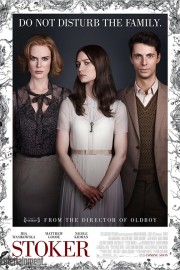Stoker
History has shown that, when Asian filmmakers have come to make their first English-language movie, things don’t really work out that great. So, the idea of South Korean provocateur Chan-wook Park (“Oldboy,” “Thirst”) making a movie in America, especially at a time when American cinema feels so watered-down and homogenized, is intriguing, but also uneasy– would Hollywood allow him to make a film as powerful as those he’s made in South Korea?
The answer is a dizzying, deranged yes. Working from a surreal screenplay by Wentworth Miller, Park has made one of the most original, troubling thrillers in recent memory. The film brings to mind the works of Hitchcock, Kubrick, and Lynch with equal doses of suspense, horror, and eroticism laced with some pitch-black humor. It’s a long year yet, but it’s hard to imagine another film being this potent and unforgettable.
Mia Waskikowska stars as India, who turns 18 on the same day her father (Dermot Mulroney) dies by unexplained circumstances. She was very close to her father; they went hunting together, and stuffed what they shot, and placed them around his study. This aggravated her mother (Evelyn, played by Nicole Kidman) to no end, and the two of them have a strained relationship as a result. On the day of the funeral, however, they get an unexpected visit by India’s uncle, Charlie (Matthew Goode). On the surface, this long-lost relative is a charmer, and a breath of fresh air in a home filled with morbid thoughts channeled by India, and picked up on by Evelyn, but India senses something not-quite-right about him. Maybe a key her father left her on this, particular birthday has some clues?
From there, discussing the film requires a lot of finesse, because there’s much in the way of twists and turns that I really don’t want to talk about. The character of India, for instance, is an unusual one. She’s always been a sullen young woman, closer to her father than her mother, and not very sociable at school. This is before her father dies. After his death, these traits are amplified. The key I mentioned earlier is a disappointing present for her, albeit mysterious; she is accustomed to her father getting her a pair of shoes each birthday. Why would this year be different? That’s just one of the things you won’t be able to pry out of me in this review.
Park is a fascinating filmmaker. His stories take human nature and psychology to the extremes, but as a cinematic storyteller, he doesn’t use extreme images and techniques. Yes, he and his cinematographer– Chung-hon Chung –do incorporate striking camera angles to help bring us into India’s world, and the film is basically told from her point-of-view, they do so in a way the evokes the filmmakers I mentioned earlier, along with the more stately works from Tarkovsky and Terrence Malick. This isn’t a fast-paced movie, but it moves at a brisk pace thanks to the headlong momentum Wook-Park creates thanks to his visual intrigue, and a soundscape featuring great, original music by Clint Mansell (with his best score for a filmmaker besides Darren Aronofsky) and Philip Glass (who wrote the seductive piano pieces in the film).
“Stoker” sucks you in, from the evocative opening images, to its final moments, which actually take us back to those early images, with India on the side of the road, looking at a field, with the wind blowing her dress from side-to-side. The journey in between is a perverse one, but worth every second as Chan-wook Park and his talented trio of actors, all of whom do fascinating, low-key work, take us on a disturbing trip through the history of a family whose secrets are more troubling than we could possibly imagine. Trust me when I say that this film gets under your skin, and stays there.










